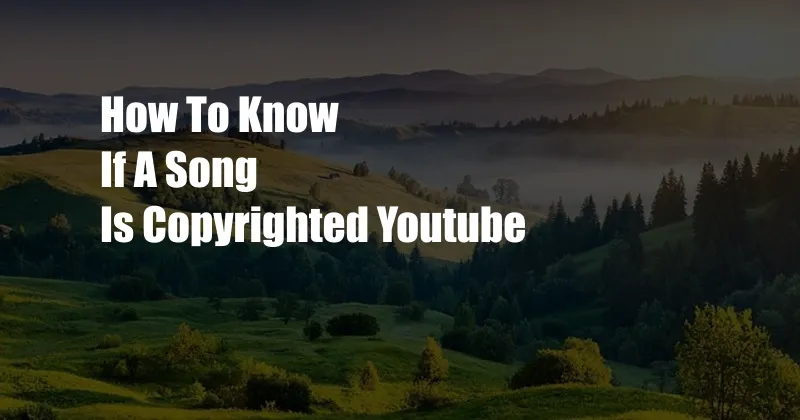
How to Determine Copyright Status of Music for YouTube
Whether you’re a budding music producer or a YouTube enthusiast, understanding copyright laws is crucial when uploading music to the platform. Misappropriation of copyrighted material can lead to serious consequences, so it’s vital to ascertain the copyright status of any song you plan to use. Here’s a comprehensive guide to help you navigate this aspect and ensure compliance with YouTube’s policies.
YouTube’s Copyright Guidelines
YouTube has strict copyright regulations in place to protect the intellectual property rights of creators. Infringing upon these guidelines can result in your videos being removed, your channel being suspended, or even legal action. Therefore, it’s essential to thoroughly research the copyright status of any music you intend to upload.
Copyright Definition
Copyright refers to the legal protection granted to the creators of original works, including music. It encompasses both the musical composition itself and the sound recording. Copyright law grants creators exclusive rights over their works, including the right to reproduce, distribute, and perform them.
Identifying Copyright Status
1. Check the Copyright Notice: Most copyrighted works will have a copyright notice attached to them, typically in the form of a “©” symbol followed by the year of publication and the name of the copyright holder.
2. Search Copyright Databases: Several online databases, such as the U.S. Copyright Office’s website, allow you to search for copyright registrations. This can help you determine whether a song is copyrighted and who owns the rights to it.
3. Contact the Artist or Rights Holder: If you’re still uncertain about the copyright status of a song, you can reach out to the artist or the music label that represents them. They can provide you with the necessary information about copyright ownership.
YouTube’s Music Library
YouTube offers a vast Music Library of royalty-free music that creators can use in their videos without copyright concerns. This music has been licensed by YouTube, so you can rest assured that you won’t face any copyright issues when using it.
Fair Use Considerations
In certain cases, you may be able to use copyrighted material under the “fair use” doctrine. Fair use allows for limited use of copyrighted works for purposes such as criticism, commentary, or education. However, it’s important to consult with a legal professional to determine whether your intended use falls within the scope of fair use.
Tips for Avoiding Copyright Issues
-
Obtain Permission: If you plan to use copyrighted music, always seek permission from the copyright holder.
-
Use Attribution: When using copyrighted material, provide proper attribution to the original creator.
-
Use Royalty-Free Music: Utilize music from YouTube’s Music Library or other royalty-free sources.
-
Be Aware of Music Recognition Software: YouTube uses sophisticated software to identify copyrighted music. Using music without permission can result in your video being flagged or removed.
-
Understand the Penalties: Copyright infringement can have serious consequences, including legal action, financial penalties, and damage to your YouTube channel’s reputation.
Frequently Asked Questions
Q: How do I know if a song is in the Public Domain?
A: Songs enter the Public Domain after a certain period of time has elapsed since their creation. The duration varies by country, but typically it’s 50 to 100 years after the author’s death.
Q: Can I use copyrighted music in my YouTube videos if I give credit to the creator?
A: While attribution is important, it doesn’t always absolve you from copyright infringement. You still need to obtain permission from the copyright holder.
Q: What happens if my YouTube video gets flagged for copyright infringement?
A: Your video may be removed, your channel may be suspended, or you may receive a copyright strike. Multiple strikes can result in your channel being terminated.
Conclusion
As you explore the world of online music, understanding copyright laws is paramount. By following the guidelines outlined in this article, you can ensure that you’re using music legally and responsibly on YouTube. Remember, respecting copyright is not just a matter of avoiding penalties; it’s also about supporting the artists who create the music that enriches our lives.
If you have any further questions or would like to discuss copyright law in more detail, please don’t hesitate to reach out.